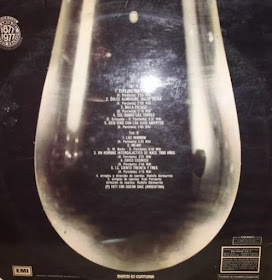Once in a while you come across an artist that absolutely knocks you off your feet (Stevie Wonder) and this time it's this Argentinian who made a long series of albums going far into the 90s but back in the midst of the glorious seventies, produced one after another progressive-stuffed opuses of incredible songwriting, super-emotional as is always the case with latin music. Very similar in fact to the much better known Luis Spinetta. There's tons and tons of progressive music here, trust me. Have a look at the discography first, and read the brief bio. (Incidentally, the LDPD holds, the albums after and including Television (1981) are really commercial pap.)
Note the interesting bio on wiki:
Raul Porchetto (born November 15, 1949) is an Argentine musician and songwriter. Porchetto emerged into the Acoustic movement of Argentine rock during the early 1970s releasing his debut record in 1972 following the subgenre's popular rise in the wake of the Acusticazo. By the mid 70s he would become a member of the first and extremely ephemeral supergroup of Argentine rock, PorSuiGieco, with León Gieco, Charly García, and Nito Mestre.
For the remainder of the 1970s Porchetto released an average of one LP a year. In 1980 his sixth album Metegol featured a very innovative type of uptown-suave sounding rock, yet remaining accessible and unpretentious when listened to. Metegol sent Porchetto's career to the top of Argentine rock. The album even beat out Serú Girán's third release Bicicleta, in a yearly rock survey by newspaper Clarín and when that group was the most popular act in Argentine rock. In a similar style Porchetto released Televisión in 1981.
Mirroring the early 80s trend towards the much more light and direct rock music of the New Democracy Sound, Raul Porchetto came out with his next two album releases. 1983's Reina Madre became one of the best selling rock albums until that time. He became the best attended solo act in concerts during the first half of the 80s. His most recognized hit is 1986's "Bailando en las veredas".
But Porchetto grew tired of the Rock Star rat race. That along with his eagerness to pursue more experimental and ambitious music led his later releases following Reina Madre to be departures from his earlier sound, and more inaccessible to casual fans (one of his late 80s albums even include actual choruses singing evangelical themes). Thus they did not sell nearly as well, and by the late 1980s Porchetto had cut ties with major record labels and went indie. He has continued to come out with albums until the present day; his latest release is Dragones y Planetas (2010). During his career Raúl Porchetto earned 10 gold, two platinum and one double platinum records, becoming one of the best selling artists of all time in Argentina.
I'll just pull a couple of the most progressive songs from the 6-album set I've included so you get an idea of what I'm talking about.
The oddly-named song and oddly-chorded song called Bao Babs is from his 1976 ST album:
The atmospheric closer to (perhaps the masterpiece) Chico Cosmico, 1977, is I.C. Ciento Triente y Tres. Be sure to listen all the way through to the end, because the last minute or so is sure to shock you completely:
Rastros de Polvo Azul, from 1978's Volando de Vida:
This is the song that literally made me fall off my chair. A relatively ordinary electric piano opening with that odd violin or whatever buzzing in the background leads into a nice electric guitar riff followed by a chorus singing the same riff. After about a minute and a half though, Raul starts singing a verse which is totally at odds with the preceding, not to mention, the melody, if such it may be called, is totally unlike anything ever heard in rock music before, sounding more like electric guitar solos set to music. At the 2-minute mark, the song once again totally changes in direction with synth-strings and a slower beat leading into a kind of symphonic bridge section. Really, a miracle in progressive songwriting, and as I said unlike anything else I've ever heard in a lifetime spent listening to this kind of stuff. It's hard to believe.
I also am reluctant to rate these works individually, except to say that the first from 1972 definitely is a bit immature and less interesting, and the 1980 Metegol is also as one might expect much more commercial and less proggy. But the four in the middle are simply astonishing. Endlessly, endlessly interesting, enjoyable, full of sudden, inventive, unique ideas.
And a very good-looking guy too, as you can see from a more recent photo:













ReplyDeleteall 6
https://www56.zippyshare.com/v/ZEPk9fm7/file.html
https://www.sendspace.com/file/98mrb6
Thanks for sharing this. I'm from Argentina. Porchetto had a huge success during the 70's and 80's. Reina Madre was a tremendous hit. Bear in mind that those were the times when Argentina was in war with the UK because of the Malvinas/Flaklands dominion. Porchetto was still active some years ago but I have lost track of him during these last years. Many thanks!
ReplyDeletealternate
ReplyDeletehttps://we.tl/t-Rx87ALYYUq
Julian, Can you help with this rare prog lp?
ReplyDeleteMister Paperrock Orchestra – Il Brutto Anatroccolo
https://www.discogs.com/Mister-Paperrock-Orchestra-Il-Brutto-Anatroccolo/release/13623591
Epic post, never heard of him before, love it a lot, keep it up Julian.
ReplyDeletethanks
ReplyDeleteenjoy